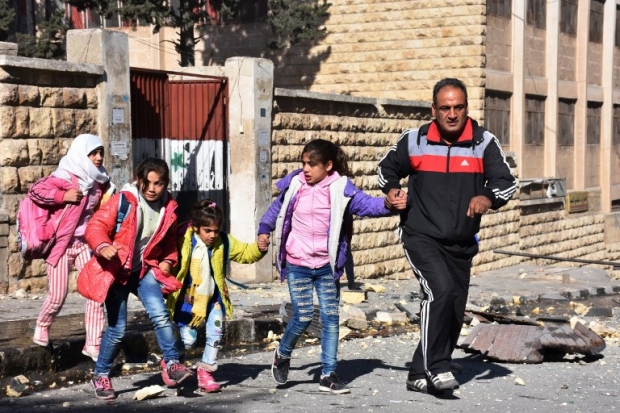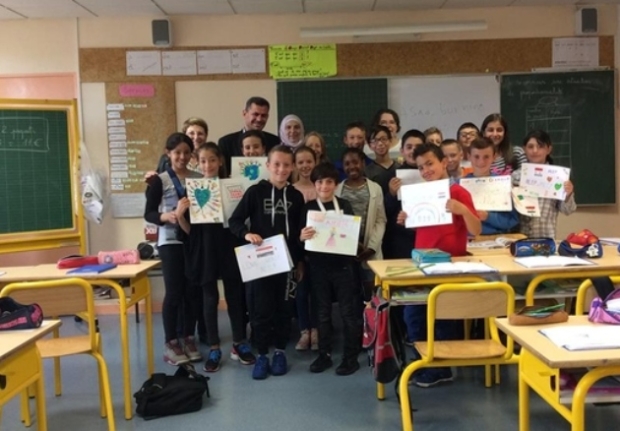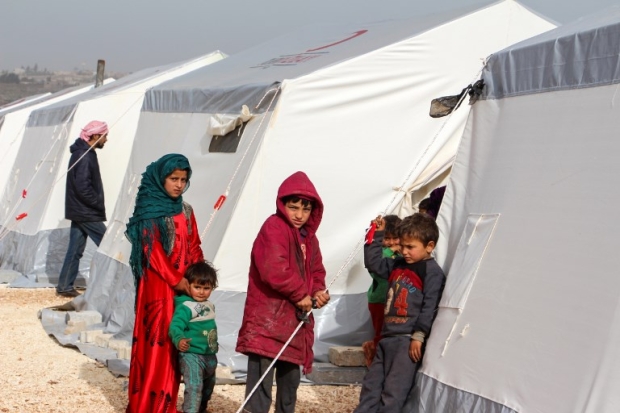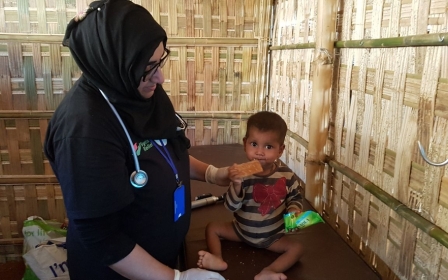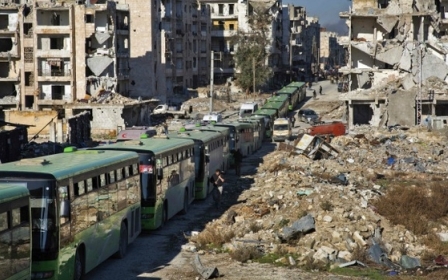Meet rural Aleppo's first woman council leader
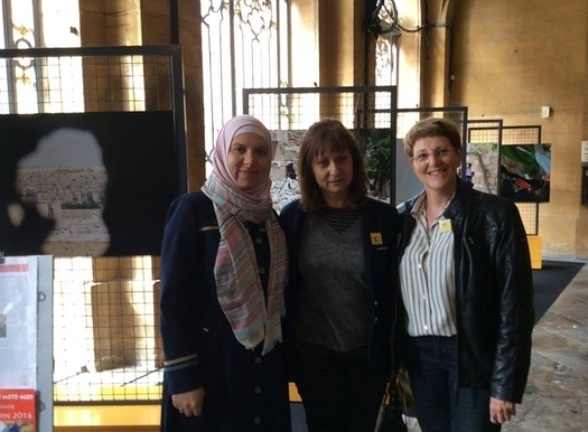
ISTANBUL, Turkey - Eman Hashem was recently elected the first female leader of the council in the rebel-held region of rural Aleppo.
For the 38-year-old Arabic literature graduate and former teacher, it was the culmination of six years of working to provide services to people in a war zone and helping build up a civic administration where one was lacking.
It has been a difficult and dangerous journey. The council had to be relocated from Aleppo city in late 2016 following a brutal offensive to retake rebel-held areas by government forces.
When the Syrian uprising reached Aleppo in 2012, she was a schoolteacher, mainly of Palestinian refugees. Soon she joined the protests along with other women from her neighbourhood, Saif al-Dolah.
Joining the protests
“After the uprising broke out, I along with many women in my streets organised and participated in anti-Assad demonstrations. Additionally, I took a core role in the medical section, treating wounded demonstrators who were shot during the protests.
“After a few intense months in my neighbourhood, when the regime gangs attacked civilian houses and kidnapped men and women due to their involvement with the demonstrations, the Free Syrian Army declared its creation and took the district, Saif al-Dolah, alongside many other areas.”
Back in Aleppo everyone was very supportive of me. I faced no discrimination or opposition as a woman
- Eman Hashem, council leader
After the end of the fighting in September 2012 when the rebels declared victory in eastern Aleppo, she resumed her work as a teacher, helping to restore education services that had been interrupted by the violence.
“At the same time I was taking part in many campaigns supporting women's roles in the liberated areas, the medical campaign as well as rebuilding schools and returning children to schools.”
She was also one of the founding members of the new Aleppo council in February 2013. Due to the war, elections could not be held and, instead, people who felt they were qualified to be a council member could apply as long as they were local and had relevant experience. Hashem became a member of the council's executive office and general committee.
She insists that being a woman was not an obstacle to her role in the council and that her family, friends and the community supported her.
“Back in Aleppo everyone was very supportive of me. I faced no discrimination or opposition as a woman,” she says.
However, her role was not without its challenges. She faced attempts by some councillors to get her to support preferred projects through bribes, but she refused and continued to work as normal, she says.
Militant groups which operated in East Aleppo also tried to interfere in the work of the council and occasionally broke into its offices.
Visit to France
In mid-2016, Hashem was invited to Paris by the French government for a tour to explain the work she and others were doing to civil society groups, schools and politicians.
At that time in 2016 she was part of the educational office in Aleppo council – which was supported by France, and along with other western governments has provided funding to NGOs and civil society in opposition-held areas.
“I was honoured to represent the council in a diplomatic mission to France. The mission was nearly ten days. I met the then French foreign affairs minister and many other senior officials in Paris.”
France funded projects in education and services such as electricity, water, street cleaning and rubbish collection. It also supported the council with training programmes on Skype and consulting about governance and project management, says Hashem.
The French were lovely hosts, but I was really sad and desperate to go back to my city, which was then under attack
- Eman Hashem
“We conducted meetings over the course of that trip, telling the French politicians about the mechanism of our work in a war zone, and our needs. They were impressed with us and showed their full support to help the council keep running in order to help Aleppo residents maintain the best services possible.”
Yet the trip coincided with the government’s offensive and air strikes to take back rebel-held areas of Aleppo.
“The French were lovely hosts, but I was really sad and desperate to go back to my city, which was then under attack. I was watching at the same time as the massacres were occurring in Aleppo. Once I apologised from attending a concert for the Aleppo council group, as I was very emotional and couldn’t handle myself.”
Soon she made her return to Syria via the strategic Castello Road into Aleppo, which at that time was extremely dangerous. Known then as "Death Road", the highway cuts through Aleppo and was the only route into the eastern side of the city.
“After we finished our mission, I got back to Aleppo from Castello Road which was being attacked and bombed. We were about to die anytime. But [I felt] this is better for me than staying in France and watching my fellow people die while I am enjoying a luxurious life in Europe.”
Chaotic evacuation
Hashem has no regrets about the decision, and today finds herself as leader of the Aleppo council that was reassembled in rural Aleppo following a chaotic evacuation of thousands of people. While some teachers stayed in government-held areas, others joined the exodus.
“After the evacuation, things were quite chaotic, until we managed to reorganise our activities and staff. The level of support we had was much reduced, and it is not as it used to be in the past.”
Everyone was looking for shelter, so the council members had to manage their resettlement, as well as organising teachers who used to work at the city council schools. “We also tried to get their financial issues solved and reorganise their work in Aleppo's rural schools.”
Outside aid has fallen dramatically since east Aleppo fell to the government. “Despite this, we are doing what we can to maintain the necessary services to our community who have suffered so much and continue to do so until now, abandoned, as we say here."
Daunting problems
The council is located in western rural Aleppo and still faces many problems. Until recently she says she was working mainly to improve the education situation for children, helping found new schools in the countryside or establishing new ones in camps, and supporting those facilities with services.
“It has been challenging to get full support after we left Aleppo, The financial support dropped dramatically. We are still far from reaching our aim of finding a decent place to study for all Aleppo migrants as well as other children from other provinces.”
Other problems the council faces are due to the unstable situation in northern Syria. “In rural Aleppo clashes [between armed groups] have been occurring frequently since we left Aleppo. Additionally, the lack of job opportunities has been quite an issue, thus we will work to set up more projects so we can provide as many jobs as we can.”
Two weeks into the job of council chief and Hashem remains positive. “I am working with our staff to empower and undertake more projects to enhance women's abilities, educational projects to support more schools trying to cover as many areas as possible."
The tasks in front of the council are daunting – and growing. “The needs are massive and it's rapidly increasing, due to the continuous migration of people from other areas which obviously increases the needs for goods and services for the growing numbers of displaced civilians.”
Fear and potential
It is commonly claimed that women are held back in political roles due to social conservatism in Syria, although Hashem believes women themselves must change their outlook.
“Regards women's role in society and civil activities, I must say that the major factor in why women don't have a proper role is because of their ignorance and fears. I believe that they put obstacles in front of themselves, and as a result we are minimising our fields of work to medicine or teaching at schools only.”
We can lead and be productive in all fields, we only need to take the initiative and be bold to take actions towards our development
- Zeina Kayali, project leader of Kafwa
Zeina Kayali is a manager of the Kafwa project, which is dedicated to supporting vulnerable women in northern Syria, and is part of the EU-funded Kesh Malek Organisation. She says Hashem’s election to lead the council is important for women in Syria right now. “Having Eman in such positions at the moment shows that women are capable of everything.
"We can lead and be productive in all fields. We only need to take the initiative and be bold to take actions towards our development, otherwise, we will stay ignorant and our rights will continue to be violated.”
Hashem says that Syrian women underestimate their capacities to advance socially and professionally, believing that they can't effectively function in other fields, such as politics and civil matters.
“My own experiences in these sectors, I believe, shows that women are able to take senior positions and can, equally as men, manage companies and production as well as many other activities in our daily life.
As head of Aleppo council – and the first woman - she sees her role as giving an example of how women are able to be in all positions and in all ministries.
"I want to be a champion for men and women who were abandoned by the international community, trying to bring as much relief, services and support as we can to the people.”
New MEE newsletter: Jerusalem Dispatch
Sign up to get the latest insights and analysis on Israel-Palestine, alongside Turkey Unpacked and other MEE newsletters
Middle East Eye delivers independent and unrivalled coverage and analysis of the Middle East, North Africa and beyond. To learn more about republishing this content and the associated fees, please fill out this form. More about MEE can be found here.


